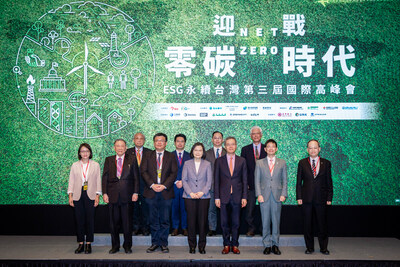TMCnet News
Accelerating the Transition to Net Carbon Emissions: Industry, Government, and Academic Leaders Come Together to Embrace the Zero Carbon AgeHow should Taiwan put its net-zero transition into practice? Ways forward have been proposed by the financial sector and the Ministry of Economic Affairs. TAIPEI, March 30, 2023 /PRNewswire/ -- Business Today, a Taiwan-based financial journal with a focus on the connection between ESG and industry, hosted the 3rd ESG & Sustainability Taiwan International Summit on March 21. The event, themed "Embracing the Zero Carbon Era", brought together leaders in industry, government and academia to find solutions setting Taiwan on the path to zero carbon. President Tsai Ing-wen also delivered a speech at the event. Business Today publisher Andy Liang noted in his welcome speech, "In the new era of carbon pricing, there is no turning away. These projects are definitely not just the government's business. Besides the government, it is something that no one in this room can ignore." Arun Majumdar, Dean of the Stanford Doerr School of Sustainability, shared his scholarly analysis that the probability of extreme weather in the summer has increased by a factor of 10 to 100 globally. Despite the fact tha several countries and regions agree on the urgency of going carbon-free, no one is sure how to get there. In the area of finance, E.SUN Commercial Bank chairman Joseph N.C. Huang said, finance creates civilization and serves as a key driver for sustainability. It also allows the bank to change its long-term goals and strategies, such as developing sustainable finance to help businesses better manage their ESG risks in the future. As to how to move the needle on improving water utilization, Stantec Consulting Services Taiwan country manager Jason Huang spoke about six initiatives to ensure the resilience and sustainability of urban water projects, including developing a circular system, boosting resilience through water reclamation and recovery, coexisting with water, maintaining water safety in food production, applying smart technology solutions to challenges related to water, and facilitating access to water for all. The most recognizable environmentally-friendly structure in Taiwan is Agora Garden (a.k.a. Tao Zhu Yin Yuan) built by Core Pacific Group. It is the world's first and only residential landmark to be included in CNN's 9 Most Influential Buildings. With 246% green coverage, the project can absorb up to 130 tons of carbon per year and use the extra rainfall to irrigate the surrounding trees, making it a low-carbon tower. It's founder and chairman, Sheen Ching-Jing, said, "We do not build homes from the standpoint of a developer trying to recycle rapidly because we feel that everyone has a responsibility to protect the environment." Chunghwa Telecom senior vice president and chief financial officer Vincent Y.S. Chen elaborated on the Taiwan-based operator's goals of halving its carbon emissions by 2030, converting to 100% renewable energy by 2040, and achieving net zero carbon emissions by 2050. According to Chunghwa Telecom's internal carbon pricing, the carbon fee is US$50 per ton, which is one of the highest in the global telecom market and represents Chunghwa Telecom's determination to remain ahead of the curve. Deloitte's corporate social responsibility leader in Taiwan, Joe Chen, explained that Taiwan's economy is dominated by small and medium-sized businesses (SMEs). Setting universal standards within the same industry and altering service models or business strategies across industries can help businesses collaborate to solve problems in the future. Semisils Applied Materials chairman Arthur Ho said, "There is no such thing as waste in the world, only misplaced resources." The company recycles semiconductor waste silicon mortar by converting it into silicon dioxide and hydrogen and builds a silicon circular economy ecosystem where hydrogen can be supplied to factories for power generation while silicon dioxide is transformed into raw materials for commercialization. Net zero carbon emissions can be achieved by making good use of waste. Many people see carbon as an expense, but these businesses provide a most practical example of how to approach the zero-carbon age by turning carbon into an asset.
SOURCE BUSINESS TODAY 
|

